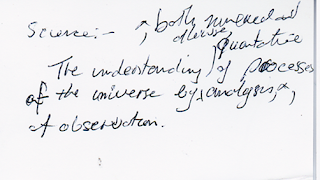 At the November Widnes Sci Bar meeting, the audience were asked to write down their definition of Science. This arose during a short discussion of the 19th Century meetings of the Widnes Qu'est-ce Que C'est Club (QCQC Club). For those interested there is a separate Blog site at this link.
The notes were collected and some are anonymous, with others signed.
The scans are presented below, in no particular order, with my attempt
to translate. [If I have mis-read
any of your words, please let me know: the post is easy to edit.] The
first part of this post is simply to report back with the answers. The
second part will be a discussion of the significance of such an exercise
and I will compare the answers with a survey of a similar number of
Science students at Sheffield, that I will carry out over the next few
weeks. I would then like to see whether we might extend the "survey"
around other Sci Bars. Many thanks for those who offered definitions,
and any late entries can be added by inserting your definition in the
Comments Box at the foot of the post.
At the November Widnes Sci Bar meeting, the audience were asked to write down their definition of Science. This arose during a short discussion of the 19th Century meetings of the Widnes Qu'est-ce Que C'est Club (QCQC Club). For those interested there is a separate Blog site at this link.
The notes were collected and some are anonymous, with others signed.
The scans are presented below, in no particular order, with my attempt
to translate. [If I have mis-read
any of your words, please let me know: the post is easy to edit.] The
first part of this post is simply to report back with the answers. The
second part will be a discussion of the significance of such an exercise
and I will compare the answers with a survey of a similar number of
Science students at Sheffield, that I will carry out over the next few
weeks. I would then like to see whether we might extend the "survey"
around other Sci Bars. Many thanks for those who offered definitions,
and any late entries can be added by inserting your definition in the
Comments Box at the foot of the post.Asking questions and seeking explanations on the "Physical" world around you
1. Systematic observation of phenomena
2. Logical consideration of the causes of the phenomena
3. Systematic extrapolation of the causes to predict the existence of unobserved phenomena
4. Experiments to prove 3.
The search to understand the nature of substances and phenomena in the physical world
...from Latin: "scio" = "know" (Greek: γνῶσις - "knowledge"
). So "science" is "knowledge", ie everything that is known by anyone anywhere. "Science" is categorised as "political", "natural", "social", "information", etc. Nothing, natural or supernatural is outside the scope of Science.
Pursuit of knowledge through systematic investigation
To gain a better understanding of the world about us. This could lead to improvements in our quality of life, perhaps.
This is a flow chart to explain the process of experimental Science, which I think is self explanatory
To gain a better understanding of the world about us. This could lead to improvements in our quality of life, perhaps.
The understanding of both numerical and less quantitative processes of the Universe by analysis and of observation
The study of why and how things happen
Science to a non-scientist:
Experiments
In Labs
Taking and testing materials
Lots of Labs working on many things
In white coats
Taking measurements
Making conclusions
Science is the study of the world around us -done in an orderly progressive manner- to explain the world we live in
A specific attitude -methodology - body of knowledge of a "scientific" nature - umbrella term for enquiry (interest it occurs) - a specific philosophy and way of seeing the physical world
Philosophy asks the questions, Science answers them. Science: the objective search for reality
The interpretation of all the processes of life in the universe and beyond in order to understand and predict the history and future of all of these processes by analysis
Study/advancement of knowledge of Nature by means of verifying theory by experiment
Science is the pursuit of knowledge of the physical environment
The study of all that exists, all that has existed and all that will exist
Science is the attempt to explain life
Empirical study of the natural world through observation and experiment. In relation to biology, chemistry and physics
The quantitative understanding of processes of the universe by the analysis of observation.
Some published definitions for comparison
Science is the pursuit and application of knowledge and understanding of the natural and social world following a systematic methodology based on evidence. [The Science Council]
The intellectual and practical activity encompassing the systematic study of the structure and behaviour of the physical and natural world through observation and experiment [OED]
...(knowledge from) the careful study of the structure and behaviour of the physical world, especially by watching, measuring, and doing experiments, and the development of theories to describe the results of these activities [CED]
From Merriam Webster comes a range of suggestions:
- the state of knowing : knowledge as distinguished from ignorance or misunderstanding
- 2a : a department of systematized knowledge as an object of study <the science of theology>b : something (as a sport or technique) that may be studied or learned like systematized knowledge <have it down to a science>
- 3a : knowledge or a system of knowledge covering general truths or the operation of general laws especially as obtained and tested through scientific methodb : such knowledge or such a system of knowledge concerned with the physical world and its phenomena : natural science
- 4 : a system or method reconciling practical ends with scientific laws <cooking is both a science and an art>





















No comments:
Post a Comment